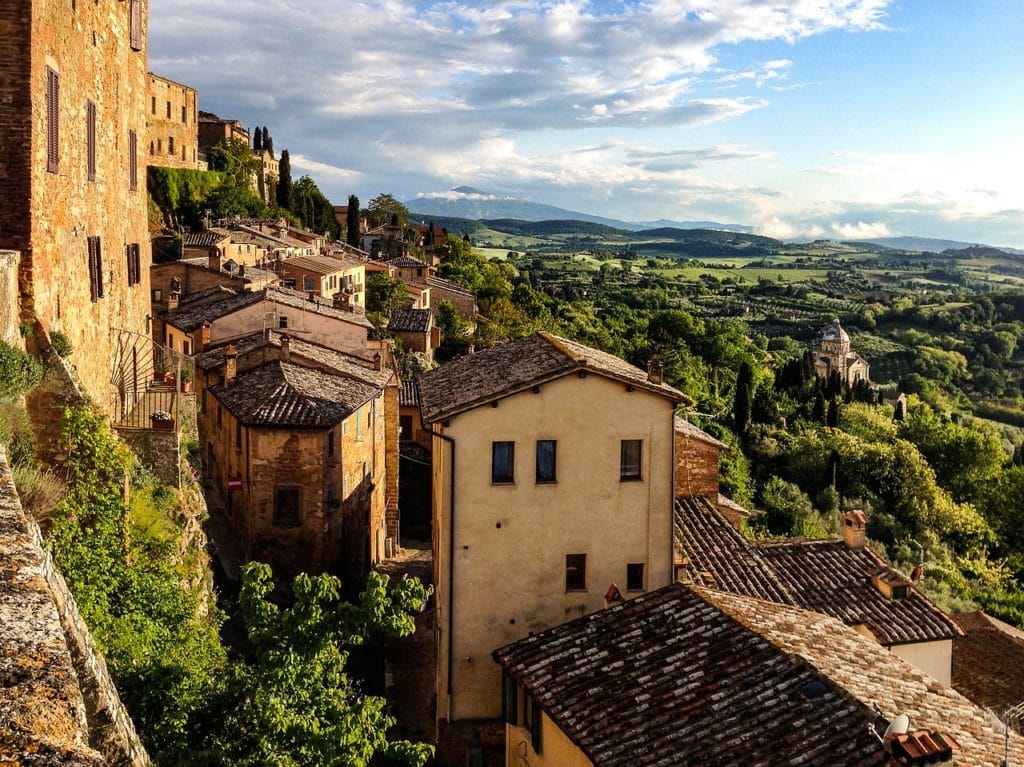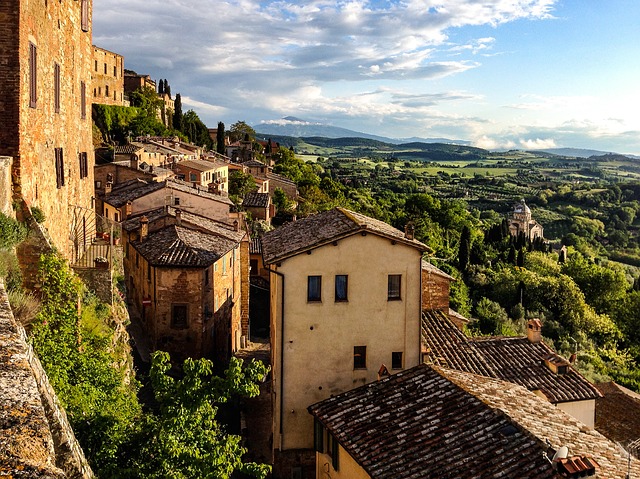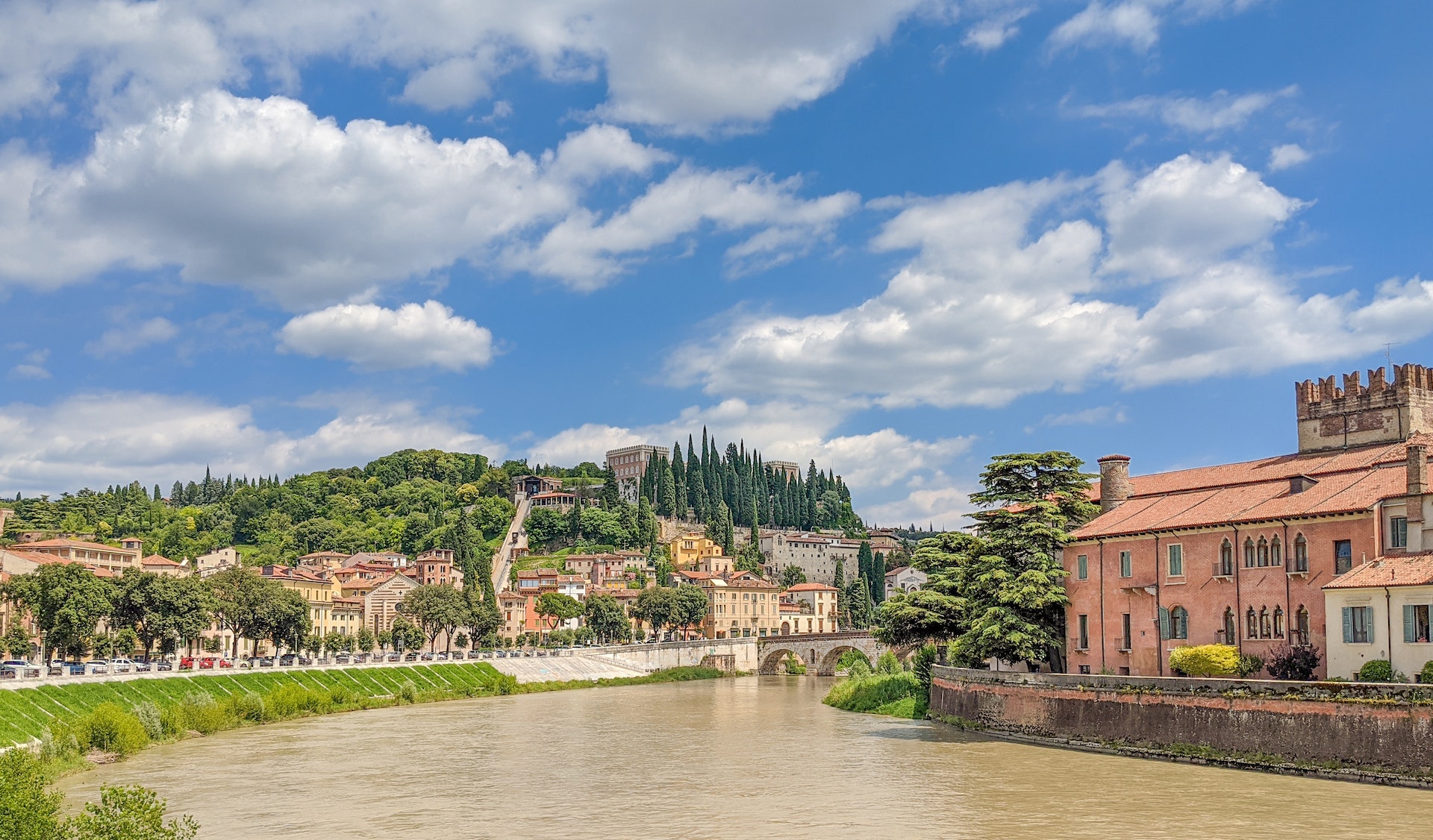
Learn Italian in Italy: 10 Language Programs From the Coast to the Mountains
If you find the right learning materials, you can get a little taste of life in Italy.
Indulging in world-renowned Italian cinema, learning with Italian language learning apps and kicking back with some dramatic Italian TV are all options you have.
But at the end of the day, there’s one clear goal: to hop off a plane and plant your own two feet on the world’s most beautiful peninsula.
Today I’ll tell you more about how to learn Italian in Italy!
Contents
- Italy: The World’s Top Italian School
- How to Choose the Right Italian Program for You
- 10 Spectacular Programs for Learning Italian in Italy
- 1. Il Sasso, Montepulciano
- 2. Terramare, Orbetello
- 3. Scuola Palazzo Malvisi, Bagno di Romagna
- 4. Piccola Università Italiana, Tropea
- 5. Cultura Italiana Bologna, Bologna
- 6. Centro Culturale Giacomo Puccini, Viareggio
- 7. Accademia Europea di Firenze, Florence
- 8. Il Centro, Milan
- 9. Lingua IT, Verona
- 10. Centro Linguistico Italiano Dante Alighieri, Rome
- How to Get the Most Out of Your Adventure Learning Italian in Italy
- And One More Thing...
Download: This blog post is available as a convenient and portable PDF that you can take anywhere. Click here to get a copy. (Download)
Italy: The World’s Top Italian School
What could be a better way to learn the Italian language than by putting yourself in the thick of it?
This approach is called full immersion, and studies have shown that it’s the best way to learn a new language. Why? Because it replicates how we learn our native tongue: by seeing, touching, hearing, tasting and receiving immediate, real-life feedback every time we speak.
If you make a mistake in your Italian workbook, you may not realize it for another week, whereas if you do the same in an Italian deli, you might get handed a red bell pepper instead of the salami you wanted. Which do you think will better motivate you to learn?
If you choose to travel to Italy to learn Italian, it’s recommended that you find a school to attend.
“But wait,” you say. “I thought immersion was about living in the country, not going back to school!”
Yes, but it’s also important to find a proper program that supplies you with the tools you need and puts you in situations where you’ll flourish.
You can find Italian language schools all over the country and their programs vary in size and length. Most programs feature intensive courses plus plenty of time to practice in the local city or countryside. They’re also very socially oriented and involve excursions, meals and parties with classmates and staff. Typically, you’ll even have the option to live with an Italian family!
Basically, immersive language programs aren’t your average language schools.
How to Choose the Right Italian Program for You
Choosing the right Italian immersion program depends on your personality and goals. Here’s what you need to take into account.
- Size of the Program/School — Do you want to be in a small, tight-knit group or have a bunch of friends to hang out with? Are you looking for more features, class options and goodies? Small programs can be more intimate, while bigger ones sometimes offer a wider range of amenities and courses.
- Location — Where do you want to go? Big cities are lively but have more tourists and more English spoken out and about. Small towns offer beauty and authenticity, but not much in the way of nightlife!
- Intensity of Course — How much time do you want to spend studying? Make sure to check if your program requires a half or full day in the classroom, how many days a week the course goes (Italians go to school on Saturday) and how much homework you’ll have to do.
- Qualifications of Staff — This is important. If the website of your program says nothing about the qualifications of the staff, don’t go there! Immersion programs should employ teachers with language teaching certifications or teaching degrees.
- Amenities Provided — What comes with your course, and what costs extra? Airport transfer, room and board, excursions, meals, social outings and seminars are common extras.
- Level of Leisure — If you find yourself sharing a classroom with diplomats and Ph.D. students, you’ve probably chosen a course that’s more language-oriented and less vacation-oriented. If you want to have a nice mix of vacation and study, be sure to ask about the opportunities for free time and what there is to do.
10 Spectacular Programs for Learning Italian in Italy
After much research, investigation and a bit of wine, we’ve compiled a list of 10 of the absolute best language programs in Italy. These programs vary in levels of intensity, size and services provided, but all of them are guaranteed to be qualified and dedicated to making their students fall in love with Italian.
1. Il Sasso, Montepulciano
This program has been churning out Italian speakers for nearly 35 years, and it just keeps getting better. Located in the heart of Tuscan wine country, Il Sasso features peaceful surroundings and excellent facilities.
A typical course consists of about four hours of lessons per day, but they also offer single-day courses for survival Italian, in case you just want a taste! Speaking of taste, you can expect excursions to local wineries and restaurants. On weekends, Florence, Pisa and Sienna are just a short train ride away.
What’s unique about Il Sasso: The variety. They offer history, business, music, art and wine courses in Italian, as well as a language course that’s done exclusively while hiking in the countryside.
2. Terramare, Orbetello
As one of the highest-rated programs in the country for years, Terramare guarantees the ultimate immersion experience. Located in Orbetello, a picture perfect Italian village on the sea, students attending Terramare can expect lessons indoors and out among the people, bars and piazzas. Orbetello isn’t too far from Rome, so don’t feel like you’re going to miss out on city life!
Despite its growing reputation, the school has remained small and is dedicated to building close relationships with students to guide them based on their specific needs.
What’s unique about Terramare: The cultural program. Terramare’s renowned cultural program gets students out and into the real Italian world at least 3 times a week. This happens in the afternoons (after lessons) and is included in the price of the course.
3. Scuola Palazzo Malvisi, Bagno di Romagna
Having trouble deciding on a week at the spa or a language immersion vacation? No worries: Bagno di Romagna is famous for its natural hot springs—in fact, the school actually designed a course around going to the spa!
To add to its luxurious feel, Scuola Palazzo Malvisi also features courses based on the famous truffle mushroom of Northern Italy, wine, cooking and hiking. But just because they offer some delectable courses doesn’t mean they skimp on the quality of the lessons. Scuola Palazzo Malvisi boasts one of the more intense courses on this list, with 26 immersive lessons per week.
What’s unique about Scuola Palazzo Malvisi: The students. Most students who attend this school aren’t from English-speaking countries, which means you’ll have to use Italian in and out of the classroom.
4. Piccola Università Italiana, Tropea
If you’re fascinated by the rustic beauty and intense flavors of Southern Italy, there’s no better spot than Tropea. The town is built on a cliff overlooking a turquoise sea, and its small winding streets will make you wonder what century you’ve been transported to.
The Piccola Università Italiana can be found in a stately, 18th-century building in the center of town, and from its balconies and grandiose windows you’ll be able to feel the sea air and hear the bustling streets below. Courses are very sea-centric and some focus specifically on sailing, windsurfing and scuba diving. You’re also sure to taste some fantastic seafood.
What’s unique about Piccola Università Italiana: The class size. Piccola Università Italiana restricts its class size to six students, meaning you’ll get personal care and attention.
5. Cultura Italiana Bologna, Bologna
Despite being a bustling city, Bologna has incredibly well-preserved historical structures—including the University of Bologna, one of the oldest universities in the world.
If you pick Cultura Italiana Bologna as your program, you’ll be learning in a 15th century building that housed the first Lord of Bologna. But you won’t only be looking at stone structures all day: you’ll also be taking in the sight of lush, green hills on your breaks. Plus, you’ll be sampling some of the best of Bologna cuisine and experience urban life the Italian way.
What’s unique about Cultura Italiana Bologna: The complete immersion. From the very first day, you’re encouraged to speak as much Italian as you can. You’ll also regularly have meetings with Italian colleagues so you’ll have ample practice striking up conversations.
6. Centro Culturale Giacomo Puccini, Viareggio
Can’t get enough of the seaside? Whether you’re looking for a peaceful beach where you can walk and clear your head, or you want to let off steam by partying the night away in a Versilian disco, the city of Viareggio has you covered. And Centro Culturale Giacomo Puccini is right in the middle of it.
The courses open from around spring to early fall, making this the perfect destination to spend a gap year and practice essential Italian phrases along the way. Each class is capped at 12 students, ensuring that you get the attention you need if you’re struggling with any aspect of your language studies.
What’s unique about Centro Culturale Giacomo Puccini: The leisure activities. Once you’re done with your lessons in the morning, you can spend all afternoon enjoying the Pinewood forest, playing tennis, riding a bicycle and more.
7. Accademia Europea di Firenze, Florence
If your interest in Italy was piqued by Renaissance art, there are few better places to stay than Florence. In fact, it’s often dubbed as the “cradle of the Renaissance.”
Almost as soon as you set foot into the Accademia Europea di Firenze (AEF), you’ll have a tour of the school itself as well as the city of Florence (Firenze in Italian). There will also be activities like tasting authentic Italian pizza from a pizzeria, wine tasting and even a concert by the school’s Music and Opera group. Of course, there’s also the 4-week Italian language courses spanning levels A1 to C2.
What’s unique about Accademia Europea di Firenze: The outdoor classes. Yes, you read that right: your language studies won’t only be confined within the four walls of a typical classroom. You’ll also get to experience the best kind of outdoor class—exposure to the sights and sounds of Florence.
8. Il Centro, Milan
Ah, Milan—home to stunning landmarks like Il Duomo, which happens to be a stone’s throw away from Il Centro.
Il Centro has been operating for almost four decades now, which is a testament to the quality of its programs. You can study under some of the best teachers Italy has to offer and with students from all over the world. Standard lessons are supplemented with authentic materials like videos, audio, games and the like.
What’s unique about Il Centro: The certification exams. If you’re planning to take the PLIDA (Progetto Lingua Italiana Dante Alighieri) as proof of your Italian proficiency, Il Centro is one of the places where you can take it. By enrolling in Il Centro, you’re already giving yourself a leg up over many other Italian learners!
9. Lingua IT, Verona
Verona isn’t just the setting of Shakespeare’s “Romeo and Juliet” and the lesser-known “The Two Gentlemen of Verona”. There’s also the Arena, which hosted gladiator fights during the time of the Roman Empire and now hosts major events like concerts and operas.
If learning Italian in “Little Rome” sounds appealing to you, Lingua IT has your back. Aside from standard Italian courses, you can also take 15 lessons to prepare for language proficiency exams like PLIDA and CILS (Certificate of Italian as a Foreign Language). And if you’re traveling with your Significant Other, they also have a one-week “twin course” designed for the two of you. Quite fitting for a school in the city where Romeo and Juliet lived!
What’s unique about Lingua IT: The cooking classes. What better way to learn Italian phrases related to food than through a cooking class in Italy? Lingua IT actually has an entire kitchen devoted to cooking Italian favorites—from well-known dishes like pasta and risotto to more obscure ones like ragu. Talk about filling your vocab notebook and your stomach!
10. Centro Linguistico Italiano Dante Alighieri, Rome
A list of schools to learn Italian in Italy wouldn’t be complete without one from Rome. The Centro Linguistico Italiano Dante Alighieri (or CLI Dante Alighieri) has been operating since 1994 and is recognized by the Ministry of Education. There are a good variety of classes—individual classes, culture classes and DITALS preparation courses, among others.
What’s unique about Centro Linguistico Italiano Dante Alighieri: The all year round classes. Unlike many language schools, CLI Dante Alighieri’s classes can be taken at any time of the year. And because it’s close to the metro lines, going to the school is just a train ride away if you’re in Rome.
How to Get the Most Out of Your Adventure Learning Italian in Italy
These programs are all dedicated to delivering the thrills, flavors and comforts of a perfect Italian vacation, but keep in mind that doing an intensive language course is hard work! Remember that immersion isn’t automatic. You need the drive to study, practice and endure a bit of mental strain if you want to walk away with some language skills in your pocket.
No matter what level you are, it’s a good idea to brush up on your Italian before you start packing. You could try immersing yourself in the language at home with FluentU.
FluentU takes authentic videos—like music videos, movie trailers, news and inspiring talks—and turns them into personalized language learning lessons.
You can try FluentU for free for 2 weeks. Check out the website or download the iOS app or Android app.
P.S. Click here to take advantage of our current sale! (Expires at the end of this month.)
The most important thing you can do is to avoid speaking English as much as possible. Speak Italian to your teachers and classmates in and out of school, and if possible, choose to lodge with an Italian family or roommate.
When school lets out each day, make sure to manage your time properly. Too much sightseeing may keep you up late doing homework, but too much time with your nose in a book won’t give you adequate time to practice what you’ve picked up at school.
When your course ends, although you may have to say arrivederci (goodbye) to Italy, it doesn’t mean you can’t keep what you’ve learned. Consciously decide to continue your studies and to bring home some of the good habits and new hobbies you picked up while you learn Italian in Italy.
This way, you’ll be able to start right where you left off when your next adventure begins!
Download: This blog post is available as a convenient and portable PDF that you can take anywhere. Click here to get a copy. (Download)
And One More Thing...
If you're as busy as most of us, you don't always have time for lengthy language lessons. The solution? FluentU!
Learn Italian with funny commericals, documentary excerpts and web series, as you can see here:

FluentU helps you get comfortable with everyday Italian by combining all the benefits of complete immersion and native-level conversations with interactive subtitles. Tap on any word to instantly see an image, in-context definition, example sentences and other videos in which the word is used.

Access a complete interactive transcript of every video under the Dialogue tab, and review words and phrases with convenient audio clips under Vocab.

Once you've watched a video, you can use FluentU's quizzes to actively practice all the vocabulary in that video. Swipe left or right to see more examples of the word you’re on.

FluentU will even keep track of all the Italian words you’re learning, and give you extra practice with difficult words. Plus, it'll tell you exactly when it's time for review. Now that's a 100% personalized experience!
The best part? You can try FluentU for free with a trial.
Start using the FluentU website on your computer or tablet or, better yet, download the FluentU app from the iTunes or Google Play store. Click here to take advantage of our current sale! (Expires at the end of this month.)













